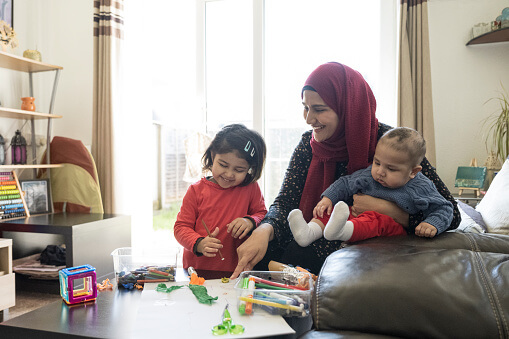
Religious Surrogacy Agencies
Surrogacy in Islam [Guide to Muslim Surrogacy Agencies]
What to Consider when Searching for a Muslim Surrogacy Agency
As a Muslim intended parent or prospective surrogate, having a complete understanding of the views on surrogacy in Islam can determine the direction you choose to take. This guide will help educate you on Islamic law and surrogacy.
Here, we answer the complicated question “Is surrogacy allowed in Islam?” and discuss Islamic opinions on surrogacy. You will also find helpful information when it comes to searching for the best surrogacy agency to review your options and to learn more about the surrogacy process.
Because traditional Islamic views strongly oppose surrogacy, you will likely want to choose a different option than surrogacy unless you practice modern beliefs that share more leniency and acceptance. Still, some feel spiritually called to surrogacy and decide to use their own interpretation of the Islamic faith as a reason to pursue this life-changing option.
Whether you want to learn more about the process, begin your own surrogacy journey, or just explore what options you have available, professionals are here to help. Anytime you have questions, you can fill out this online form to get more information from a surrogate professional. They will be happy to provide answers, insight, and the resources you need as you determine what is best for you.
In the meantime, continue reading this guide on your options for surrogacy as a Muslim and the agencies that can help determine your right path.
Is Surrogacy Allowed in Islam?
Because the majority of religions were established thousands of years before IVF or gestational surrogacy technology and procedures were even a thought. It can be difficult to determine whether surrogacy is really ethical for your religious beliefs as a surrogate or intended parent. This leads to questions about Islamic law and surrogacy, with questions like:
- Is it Haram to have a surrogate?
- Is gestational surrogacy allowed in Islam?
- Many others
Although Islamic beliefs support pursuing assistance in the cure and treatment for infertility and assisted reproductive technologies, surrogacy is not accepted in the traditional Islamic faith and is considered Haram and does not allow gestational surrogacy. Here is why.
Islamic laws consider it to be adultery to introduce the sperm of a man into a woman who is not his wife. This ruling extends to a man impregnating a woman who is not his wife with an in-vitro conceived embryo, eliminating the option of having a surrogate carrier. Although American surrogacy laws protect the intended parents, Islamic views on surrogacy portray the baby as the legal child of the birth mother and the mother’s husband, regardless of who the egg and sperm donors were.
As mentioned, Islamic beliefs support pursuing infertility treatments and assisted reproductive technologies. Using the IVF process to conceive embryos is only permissible if the egg and sperm are both from the married couple. This is not a realistic option in most surrogacy situations, making it unlawful to transfer any other embryo into another woman’s uterus and eliminating surrogacy as a religiously supported means of producing a child.
Depending on your personal views and involvement with Islamic beliefs, you may still feel compelled to pursue surrogacy as a surrogate or an intended parent. Because the views strongly oppose this option for childbirth, we suggest speaking to a trusted spiritual leader for more insight. You can also fill out this form to learn more about Islamic law and surrogacy.
You may consider reaching out to the following agency to discuss your specific situation and for professional guidance on what best aligns with your goals.
- American Surrogacy
- Circle Surrogacy
Consider Adoption
With surrogacy being considered Haram, many families facing infertility issues struggle with what to do to fulfil their lifelong dreams of becoming parents. Although the majority of Islamic countries will have different requirements, many intended parents pursue adoption to achieve their goals of parenting a child.
Adoption in Islamic countries is less common than in most places around the world, but it is still an option and is viewed more positively than surrogacy. Some Islamic countries grant guardianship as opposed to adoption, but the concept and life-changing impact for everyone involved are the same. If you decide to pursue adoption, it is best to work with an agency that is familiar with each country’s requirements and laws.
Below you can find trusted agencies that will be able to provide you with more information or start your adoptive journey.
- American Adoptions
- Gladney Center for Adoption
Contact a Surrogacy Professional
Ultimately, you control your decision to pursue surrogacy as a surrogate or intended family. Understanding the spiritual impact it may have and if you are going against Muslim views on surrogacy is important before making any decisions.
If finding a professional who will support your beliefs and respect your values from start to finish is a point of emphasis, fill out this online form. By doing so, you will be in contact with a surrogacy professional and learn more information about the surrogacy process as a Muslim. Pursuing the life-changing path of surrogacy may be one of the best decisions you ever make — fortunately, you don’t have to make that decision alone.
Ready to get started? Contact a surrogacy agency now to get free information.